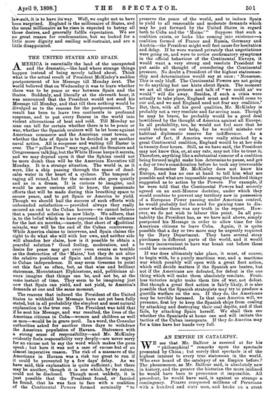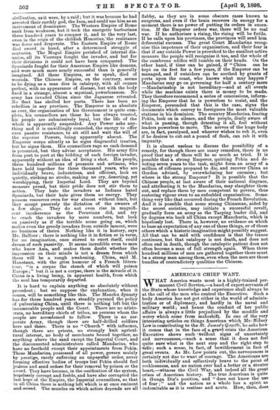AN EMPIRE IN CATALEPSY.
WE see that Mr. Balfour is sneered at for his " philosophical " remarks upon the spectacle presented by China ; but surely that spectacle is of the highest interest to every true statesman in the world. Who ever heard of the catalepsy of an Empire before ? The phenomenon, as Mr. Balfour said, is absolutely new in history, and the greater the historian the more inclined he would have been to pronounce it impossible. All precedent, he would have said, is against so strange a contingency. Pizarro conquered millions of Peruvians with a hundred and sixty men, and broke tID a ereat civilisation, as it were, by a raid ; but it was because he had arrested their earthly god, the Inca, and could use him as an instrument of dominance. The Western Empire of Rome sank from weakness, but it took the energetic barbarians three hundred years to conquer it, and to the very last, even in the reign of the childish Honorius,"the resistance was fierce and desperate. The Eastern Empire of Rome died sword in hand, after a determined struggle of centuries. The Mogul Empire perished of internal dis- union, all its Viceroys fought the invader, and but for their divisions it could not have been conquered. The Spaniards fought for their American Empire like demons, and were much more nearly successful than is generally imagined. All these Empires, so to speak, died of wounds. The Chinese Empire, on the contrary, seems to be dying as a man dies in catalepsy, with all organs perfect, with no appearance of disease, but with the body fixed in a strange, almost a mystical, powerlessness. No army has invaded China since the Japanese retreated. No fleet has shelled her ports. There has been no rebellion in any province. The Emperor is as absolute as ever, the organisation of his Government is quite com- plete, his counsellors are those he has always trusted, his people are submissively loyal, but the life of the whole is apparently suspended. Any Power asks any- thing and it is unwillingly conceded, the energy to offer even passive resistance, to sit still and wait the will of the superior Powers, being apparently absent. The Emperor weeps silently as he signs disgraceful treaties, but he signs them. His counsellors rage as each demand is presented, but they advise acceptance. His army flits from port to port at the bidding of each foreign invader, apparently without an idea of firing a shot. His people, three hundred millions of peasants and artisans, who have held together for three thousand years, who are individually brave, industrious, and efficient, look on quietly, striking no stroke, making no cry, deserting, yet worshipping, their Imperial Lord. They are beyond measure proud, but their pride does not stir them to action. They hate the invaders as Indians hated Spaniards, but their hate gives them no energy. They possess resources even for war almost without limit, but they accept passively the dictation of the owners of a few ships. They do not even rise in magnifi- cent incoherence as the Peruvians did, and try to crush the invaders by mere numbers, but look on passively as if the terrible scene going on, which makes even the greedy invaders from outside lament, were no business of theirs. Nothing like it in history, says Mr. Balfour ; there is nothing like it in fiction or in verse, for no imagination, once stirred to exert itself, could dream of such passivity. It seems incredible even to men who know Asia, and makes them doubt whether the impression on their minds is not a dream from which there will be a rough awakening. China, said M. Hanotaux, with the grim humour of a French litters- tour, "is a corpse the stench of which will poison Europe ; " but it is not a corpse, there is the miracle of.it. China is a living being, in apparent health, from which the soul has temporarily departed.
It is hard to explain anything so absolutely without precedent ; but we suppose the explanation, when it comes, will be something like this. The Manchu dynasty has for three hundred years steadily pursued the policy of pulverising China, until there is nothing left but the innumerable people and the Court. There are no aristo- crats, no hereditary chiefs of tribes, no persons whom the people are accustomed to follow. There is no cor- porate Army, though there are half-drilled soldiers here and there. There is no " Church " with influence, though there are priests, no strongly knit agricul- tural interest, no body of merchants bound together, no anything above the sand except the Imperial Court, and the disconnected administrators called Mandarins, who have no foothold except their appointments from Pekin. These Mandarins, possessed of all power, govern mainly by prestige, rarely enforcing an unpopular order, never forming effective bodies of troops lest Pekin should feel jealous and send orders for their removal by poison or the sword. They have become, in the ossification of the system, hopelessly corrupt and feeble, and have also corrupted the last hope of the Empire, the Imperial counsellors, so that in all China there is nothing left which is at once eminent -and-sound. -The muscles on which action depends are all flabby, as they are in some obscure cases known to surgeons, and even if the brain recovers its energy for a moment there is no power of putting its orders in execu- tion. If the Emperor orders war, there will be no real war. If he authorises a rising, the rising will be futile. If he calls upon his provinces, the provinces will send him deferential excuses. The great Court Mandarins recog- nise this impotence of their organisation, and their fear is that if any outside Power is provoked to the smallest active measure the people will recognise it too, and the whole of the cumbrous edifice will tumble on their heads. On the other hand, if time can be gained, if "China can be kept on its feet for a few years, if the Emperor can be managed, and if outsiders can be soothed by grants of ports upon the coast, who knows what may happen ? Mandarins may go on governing for half a century more —Mandarinship is not hereditary—and at all events while the machine exists there is money to be made. They therefore recommend a series of concessions, inform- ing the Emperor that he is powerless to resist, and the Emperor, persuaded that this is the case, signs the documents which convey to foreigners the most valuable stations in his dominion. The country Mandarins, fearing Pekin, look on in silence, and the people, dimly aware of what is passing, though detesting it all, feel without leaders powerless to move. The nerves of the huge body are, in fa,ct, paralysed, and whoever wishes to rob it, even if he desires to cut out a pound of flesh, can rob it with impunity.
It is almost useless to discuss the possibility of a remedy, for though there are many remedies, there is no proof that any of them will be so much as tried. It is possible that a strong Emperor, quitting Pekin and de- voting seven years to the task, might form an army of a million of riflemen prepared to die, and recover China as Gordon advised, by overwhelming her enemies ; but where is the strong Emperor ? It is possible that the Chinese people, at last aware of their national disgrace, and attributing it to the Mandarins, may slaughter them out, and replace them by men competent to govern, thus restoring vigour even to an enfeebled organisation. Some- thing very like that occurred during the French Revolution. And it is possible that some strong Chinaman, aided by the secret societies, may initiate a successful revolt, gradually form an army as the Taeping leader did, and by degrees win back all China except Manchuria, which is hopelessly lost. There is, however, no evidence on which to base an expectation of any one of these things, or of those others which a historic imagination might possibly suggest. All that can be said with confidence is that the trance continues, but that catalepsy is not death, and does not often end in death, though the cataleptic patient does not often become a man of full strength again. When three hundred millions of men are gathered together there must be a strong man among them, even when the men are those bundles of contradictory qualities the Chinese.



































 Previous page
Previous page